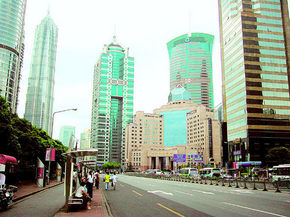Posted on : Nov.13,2006 14:13 KST
Modified on : Nov.14,2006 14:38 KST
 |
|
Shanghai Pudong, an iconic example of China's economic rise.
|
Reduced tax benefits see firms moving production elsewhere
Volta Tach Co., a South Korean firm that produces batteries for communications instruments out of its factory in Shenzen, China, plans to establish a new factory in Binh Duong, Vietnam. With the Chinese government increasing trade restrictions and reducing tax benefits for exported products, the status of smaller South Korean companies manufacturing in China is becoming increasingly insecure.
Volta Tech currently pays 170,000 won (US$180) in taxes for manufacturing every one million won worth of goods, receiving a refund of all but 40,000 won of the taxes after presenting proof of export of the products. However, such a tax benefit will cease at year-end.
Wi Un-bok, a Volta Tech official in charge of overseas marketing, explained, "Our business uses many non-ferrous metals such as lead and thus produces serious concerns [for China] regarding environment pollution. Due to the fact that the Chinese government intends to reduce benefits and to strengthen regulation over the industry, and that the cost of labor in China has been skyrocketing, we are going to move our base of production to Vietnam."
According to November 12 report by the Korea Trade-Investment Promotion Agency (KOTRA) on Chinese trade measures, the Chinese government reduced tax benefits on 1,130 items in September and then added 804 products to a list of trade restrictions. Such measures are aimed at lowering the competitive edge of the kind of products manufactured by foreign companies in China, such as non-ferrous metals and textiles, the report said.
Other motives for Beijing’s moves cited by experts and industrial officials included a shortage of resources, environmental pollution, the necessity to promote advanced domestic industries, the need to restructure underdeveloped industries, trade conflicts following the attraction of foreign capital, and pressure from the United States to revalue the Chinese Yuan at a higher per-dollar rate.
The report predicted that small South Korean companies taking part in Chinese markets will be seriously hit by Beijing’s moves, while 2 percent of the total trade between South Korea and China is expected to be vulnerable to the effects of China’s recent moves.
Companies manufacturing daily items such as furniture and plastic goods will likely suffer serious damage in particular, the report said. Overall, small companies will have to consider withdrawing from China or moving to a third country due to lowered profits, it said.
Hwang Jae-won, a KOTRA official, said that there had been warning signs years ago. The related companies, however, did not take appropriate measures in order to survive in the Chinese market, he said.
About 80 percent of over 6,000 South Korean firms doing business in Chingdao, in fact, are expected to take a hit due to China’s recent measures.
Lee Mun-hyeong, a researcher at the Korea Institute for Industrial Economics and Trade (KIET), warned that in Vietnam, as well, South Korean companies could face the same kinds of pressure someday and should be prepared to adapt or leave once again.
[englishhani@hani.co.kr]

